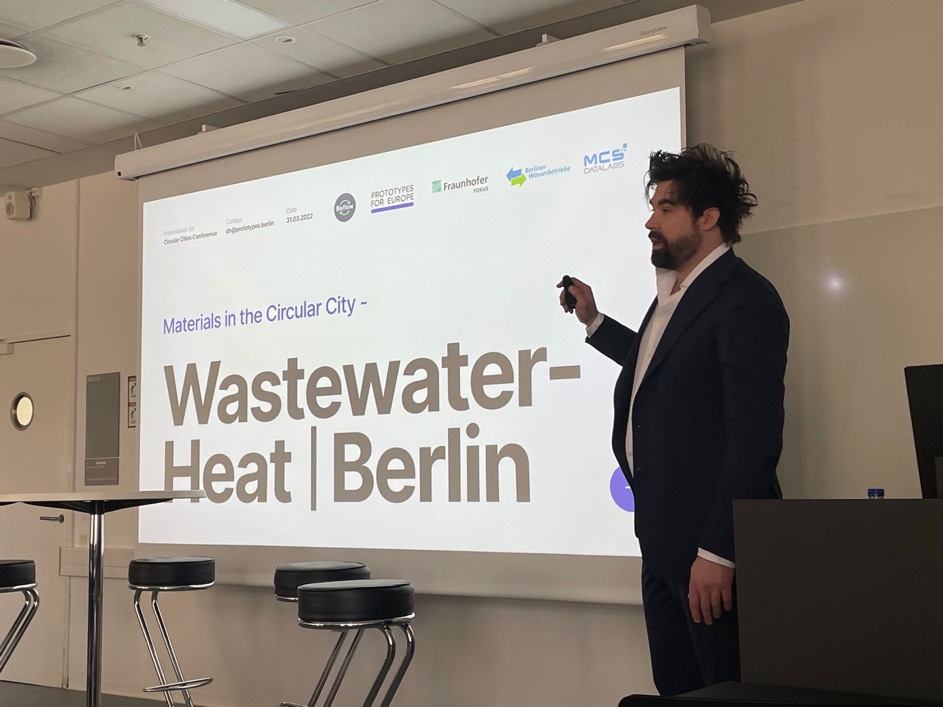Waste Heat Radar Ready for Europe
Cities and Utility Firms Invited to Jointly Develop Solutions for the Energy Crisis
Prototypes for Europe (P4E), technology firms and Berlin’s water utility developed a wastewater heat radar that matches supply and demand of this form of energy. The work was presented at the final REFLOW conference on March 31, 2022. While the development initially focused on wastewater heat, exploratory studies during the three-year project have shown that the opportunity is much vaster if waste heat in general, and not just wastewater heat, is the target of the intervention. The tool, a data-heavy, yet easy to handle software platform, shall be applied to numerous sources of waste heat.
From Berlin to Europe
Since several years Berlin’s water utility is engaged in the recovery of wastewater heat. The hardware exists since long, but awareness and implementation rate are low. As a consequence only a tiny fraction of the wastewater heat available is actually used. Residential and industrial properties emit a significant amount of heat contained in wastewater, but the lack of an efficient tool has held back the number of implementations in the city. There are currently 12 installations, one of them with IKEA.
The development on the Wastewater Heat Radar, soon to be renamed ‘Waste Heat Radar’, was challenging because of the different sources of data and simulations that had to be integrated in order to show a potential user whether and how much emitted wastewater heat is available from a given property. ‘But it is exactly this work that is rewarding’, says Daniel Heltzel, Director at P4E. ‘It showed us the opportunity the matchmaking tool has when appled to more than one form of wasteheat. This is where a large potential lies for Europe as a whole’, says Heltzel. ‘The current European political situation and unreliable interdependencies in energy supplies are a sad backdrop to what should be done in consequently harnessing wasteheat, be it in the form of water, in server farms, industrial production or else.’
Cities and Utilities Across Europe Called Upon to Make Citizens Part of the Change
Still more work needs to be done. The radar in its current form needs to be adopted to different city environments. Other data, particularly of different energy sources, have to be integrated. This calls for cooperation and co-creation. While marking the soon end of the REFLOW project, the conference in Copenhagen was the kickoff for further exploitation across Europe. Many steps will follow. European cities and utilitiy firms are invited to join P4E in making the change to waste heat recovery on city level happen. ‘One of the several great advantages our technology possesses is the possiblity to engage citizens’, says Heltzel. ‘A data-rich matchmaking technology really involves both emitters and users of the various forms of energy.’ Cities, experts, utilities, engineers and other stakeholders are invited to reach out to P4E, share ideas and co-create with P4E.
Circularity Will Affect All of Society
Copenhagen Business School, the coordinator of the REFLOW project, organized the two-day conference in an online/offline format, giving speakers an opportunity to exchange views on very diverse topics, from technology to governance, from research to citizen engagement, all related to circular economies.
On March 30, both external speakers and REFLOW participants elaborated on the relevance circular material and resource flows have for a well-balanced economic and social life in Europe. It starts with research: Dr. Britta Gammelgaard, Professor for Supply Chain Management at Copenhagen Business School and Editor at the International Journal of Logistics, states: ‘We have to think much more across the bounderies of our own research fields; we have to be way more creative.’– To navigate successfully in such environment there are no questions that can’t be asked. Some speakers reflected on the thought how much of economic growth is good or whether it is needed at all in a circular economy. For a complete list of speakers on March 30 see: https://reflowproject.eu/blog/reflow-final-event-programme-day-1-online
Changes across Different Material and Resource Flows
Day 2 of the conference, March 31, was primarily focused on the work that has been performed in six pilot cities across Europe. The presented use cases and demonstrators reflected a great variety, showing how diverse and rich the field of circular economies truly is. The work had been co-created under the strategic guidance of project coordinator Copenhagen Business School.
Technology firm Dyne presented its massive work on the REFLOW OS operating system. It is developed for communities who want to create federated and secure economic networks to foster the creation and coordination of distributed value chains. The work, including he material passport, is a technical cornerstone of the REFLOW project, enabling other cities and regions to engage in circular economies.
Guests had a chance to visit booths of the six pilot cities and talk in-depth with the pilot representatives. Cristiana Parisi, Assciate Professor in Management Control at Copenhagen Business School and Overall REFLOW Project Coordinator, concluded the successful conference with a panel discussion ‘REFLOW and beyond’. For a complete list of speakers on March 31 see: https://reflowproject.eu/blog/reflow-final-event-programme-day-2-inperson/
 Daniel Heltzel, Director at Prototypes for Europe, presenting in Copenhagen
Daniel Heltzel, Director at Prototypes for Europe, presenting in Copenhagen